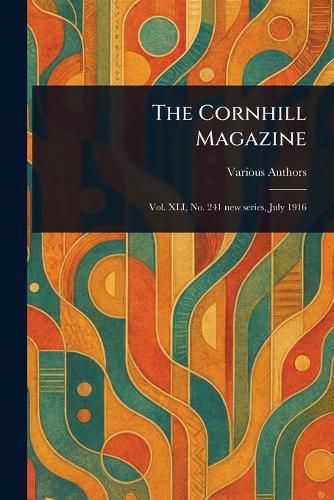Readings Newsletter
Become a Readings Member to make your shopping experience even easier.
Sign in or sign up for free!
You’re not far away from qualifying for FREE standard shipping within Australia
You’ve qualified for FREE standard shipping within Australia
The cart is loading…






This title is printed to order. This book may have been self-published. If so, we cannot guarantee the quality of the content. In the main most books will have gone through the editing process however some may not. We therefore suggest that you be aware of this before ordering this book. If in doubt check either the author or publisher’s details as we are unable to accept any returns unless they are faulty. Please contact us if you have any questions.
Step back in time with "The Cornhill Magazine, Vol. 41, No. 241, new series, July 1916," a window into British history and English literature from the early 20th century. This meticulously reprinted periodical offers a diverse collection of short stories and insightful essays, capturing the literary landscape of its era.
A treasure trove for enthusiasts of literary collections and criticism, this volume provides a glimpse into the cultural and intellectual currents shaping Great Britain during a pivotal time. Explore a range of voices and perspectives, reflecting the social and historical context of the period.
"The Cornhill Magazine" stands as a testament to the enduring power of the written word, offering readers a unique opportunity to engage with the thoughts and creative expressions of a bygone age. Whether you're a student of literature, a history buff, or simply a lover of classic writings, this volume promises a rewarding and enriching reading experience.
This work has been selected by scholars as being culturally important, and is part of the knowledge base of civilization as we know it.
This work is in the public domain in the United States of America, and possibly other nations. Within the United States, you may freely copy and distribute this work, as no entity (individual or corporate) has a copyright on the body of the work.
Scholars believe, and we concur, that this work is important enough to be preserved, reproduced, and made generally available to the public. We appreciate your support of the preservation process, and thank you for being an important part of keeping this knowledge alive and relevant.
$9.00 standard shipping within Australia
FREE standard shipping within Australia for orders over $100.00
Express & International shipping calculated at checkout
This title is printed to order. This book may have been self-published. If so, we cannot guarantee the quality of the content. In the main most books will have gone through the editing process however some may not. We therefore suggest that you be aware of this before ordering this book. If in doubt check either the author or publisher’s details as we are unable to accept any returns unless they are faulty. Please contact us if you have any questions.
Step back in time with "The Cornhill Magazine, Vol. 41, No. 241, new series, July 1916," a window into British history and English literature from the early 20th century. This meticulously reprinted periodical offers a diverse collection of short stories and insightful essays, capturing the literary landscape of its era.
A treasure trove for enthusiasts of literary collections and criticism, this volume provides a glimpse into the cultural and intellectual currents shaping Great Britain during a pivotal time. Explore a range of voices and perspectives, reflecting the social and historical context of the period.
"The Cornhill Magazine" stands as a testament to the enduring power of the written word, offering readers a unique opportunity to engage with the thoughts and creative expressions of a bygone age. Whether you're a student of literature, a history buff, or simply a lover of classic writings, this volume promises a rewarding and enriching reading experience.
This work has been selected by scholars as being culturally important, and is part of the knowledge base of civilization as we know it.
This work is in the public domain in the United States of America, and possibly other nations. Within the United States, you may freely copy and distribute this work, as no entity (individual or corporate) has a copyright on the body of the work.
Scholars believe, and we concur, that this work is important enough to be preserved, reproduced, and made generally available to the public. We appreciate your support of the preservation process, and thank you for being an important part of keeping this knowledge alive and relevant.